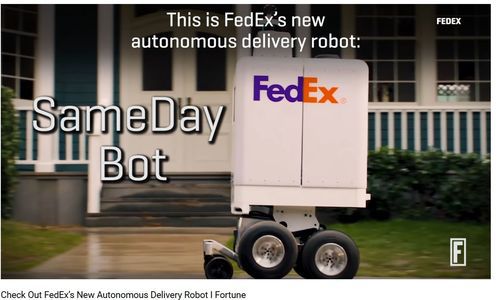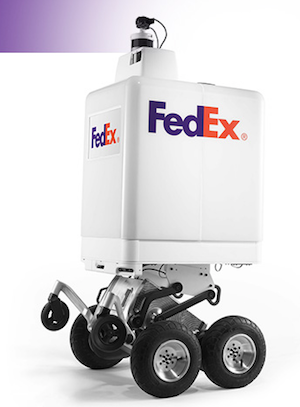
03/17/2019
We’ve seen small autonomous shipping vehicles for a couple years now, like the Starship company’s model which has been tested in cities like Austin and Washington DC.
So the new model from Fed-Ex is interesting in that it represents a tech advance by surmounting one modest step in the video below, but nothing more challenging than that.
These machines do look adapted so far for flat land only, and would never make it up the 10 steps to my front door. Even a good climber robot might be challenged by carrying a heavy load that might cause it to topple over.

Clearly, real stairs are the next big problem to be solved in order for this technology to be widely used.
So human delivery persons are safe for a little while longer in the hilly neighborhoods of America. It’s been a good starter or part-time job for young people, but not for much longer if industry has its way in creating an automated future.
FedEx partners with Walmart, Pizza Hut to test last-mile delivery robot, Reuters, February 27, 2019
(Reuters) — FedEx Corp this summer plans to begin testing a robot to handle home deliveries for partners ranging from Walmart Inc to Pizza Hut.
Shippers, retailers and restaurants are experimenting with robots, drones and self-driving cars in a bid to use automation to drive down the high cost of delivering gadgets, groceries and even cups of coffee the “last mile” to consumer doorsteps.
Fed-Ex is teaming up with DEKA Development & Research Corp, whose founder Dean Kamen invented the Segway stand-up scooter and iBot stair-climbing wheelchair, for its project. The delivery company said the robots could become part of its SameDay service that operates in 1,900 cities around the world.
The battery-powered robots look like coolers on wheels. Cameras and software help them detect and avoid obstacles as they roam sidewalks and roadways at a top speed of 10 miles (16 km) per hour.
The project must win approval in test cities, including the shipper’s hometown of Memphis, and the first deliveries will be between FedEx office stores.
On average, more than 60 percent of merchants’ customers live within three miles of a store location. FedEx said it is working with its partners, which also include AutoZone Inc and Target Corp, to determine if autonomous delivery to them is a viable option for fast, cheap deliveries.
The “last mile” to the home accounts for 50 percent or more of total package delivery costs. Restaurants pay third-party delivery companies like Uber Eats, DoorDash and GrubHub commissions of 10-30 percent per order.
Investors and companies are pouring millions of dollars into projects aimed at lowering those costs and overcoming regulatory hurdles. For safety reasons, many states want autonomous vehicles to have humans as emergency backup drivers.
Starship Technologies, which has raised more than $40 million in venture funding, last year deployed robots to deliver packages in the San Francisco Bay Area. (Continues)
This is a content archive of VDARE.com, which Letitia James forced off of the Internet using lawfare.